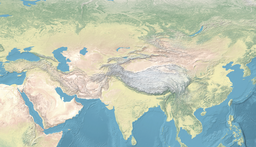
Back بحيرة إلتون Arabic بحيره التون ARZ Elton gölü Azerbaijani Эльтон Bashkir Эльтон Byelorussian Елтон Bulgarian Ozero El'ton CEB Elton (jezero) Czech Эльтон CV Eltonsee German
| Lake Elton Эльтон | |
|---|---|
 The shores of Lake Elton | |
| Location | Volgograd Oblast |
| Coordinates | 49°8′0″N 46°40′0″E / 49.13333°N 46.66667°E |
| Type | Hypersaline lake |
| Basin countries | Russia |
| Surface area | 150 km2 (58 sq mi) |
| Max. depth | 0.6 m (2 ft 0 in) |
| Surface elevation | −18 m (−59 ft) |

Lake Elton (Russian: Эльтон; Kazakh: Эльтон, romanized: Elton) is a salt lake in Volgograd Oblast, Russia, near the border with Kazakhstan. It has an area of 152 km2 and is about 0.1 m deep (in spring 0.7 to 0.8 m). Its surface is 18 m below sea level.[1] The lake's name originates from the Mongol language: “Altyn-Nor” (Golden Bottom). Long ago local nomads used the lake's mineral-rich mud for skin and respiratory treatments.[2] For centuries, Lake Elton was a favorite location for Russian rulers and nobles. One can still see remnants of Empress Yekaterina II's “bath” there.[2]
It is the largest mineral lake in Europe and one of the most mineralized in the world. The lake is filled with a saturated salt solution. Mineralization is 200–500 g/L. Salt, extracted from the lake since the early 18th century, is used for the production of magnesium chloride.[3] The water contains Dunaliella salina algae that give a reddish shade to the lake. At the bottom of the lake are salt deposits (mainly NaCl, KCl) and beneath them, a layer of mineral hydrogen sulfide mud.
- ^ Эльтон (озеро), Great Soviet Encyclopedia
- ^ a b Egorov, Boris (2018-10-11). "Why did Russia's tsars love Lake Elton?". www.rbth.com. Retrieved 2021-07-09.
- ^ "Lake Elton | lake, Russia". Encyclopedia Britannica. Retrieved 2021-07-09.


